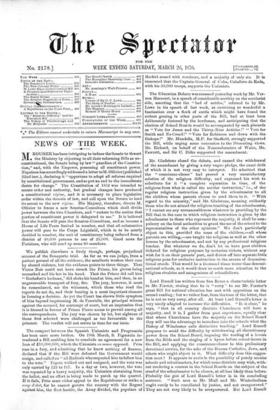Mr. Gladstone closed the debate, and caused the withdrawal of
the amendment by giving a very vague pledge, the exact drift of which it is not very easy to interpret. Ile admitted that the "conscience-clause" had proved a very unsatisfactory solution of the religious difficulty, and expressed his wish to substitute for it "a complete separation in time, of the religious from what is called the secular instruction," i.e., of the regular religious instruction given by the schoolmaster to all the children whose parents choose to send them to it. " With regard to the minority," said Mr. Gladstone, meaning evidently those who do not attend the religious teaching of the schoolmaster, "I cannot see any unreasonableness whatever in providing by the Bill that in the case in which religious instruction is given by the schoolmaster to those who represent the majority, it shall be com- pulsory on the local authorities to grant the use of the school to the representatives of the other opinions." We don't particularly object to this, provided the mass of the children,—all whose parents are willing,—are taught the religious as well as the other lessons by the schoolmaster, and not by any professional religious teacher. But whatever we do, don't let us have poor children ticketed for religious purposes by sectarian tickets, without any wish for it on their parents' part, and driven off into separate little religious pens for exclusive instruction in the arcana of denomina- tional creeds. That would be a thousand times worse than denomi- national schools, as it would draw so much more attention to the religious rivalries and antagonisms of schoolfellows.


































